- Microcontrollers
- Sensors
- Motor Control
- Smart Switches
- Security
- Arduino
- MicroPython
- Raspberry Pi
- Arduino Uno
- Adafruit Feather
- Infineon2Go
- Raspberry Pi
- HAT
- Breakout Boards
Infineon for Makers provides solutions for engineers, maker professionals, hobbyists and technical enthusiasts to turn innovative ideas into real designs.
Here you find a wide portfolio of products enabled for fast prototyping ecosystems as well as an active maker community sharing project ideas and hands on guides – all designed to inspire and accelerate your design process.
Infineon Shields for Arduino are designed and built based on the Arduino UNO form-factor. All these power focused shields interface seamlessly with Arduino Uno shaped microcontroller boards and target applications such as motor control and smart switching.
Infineon’s microcontroller boards featuring form factors such as Arduino Uno, Infineon2Go and Adafruit feather are compatible with the Arduino IDE and MicroPython. This allows developers to get started quickly and build prototypes easily.
Infineon2Go products form a diversified portfolio of boards featuring Infineon sensors, security ICs and low power drives at a small form-factor.
These are available in breakout board configuration as Shield2Go or come with an onboard XMC microcontroller as Kit2Go.
Infineon also offers Raspberry Pi HATs as well as a Shield2Go adapter, specifically made for the 40-pin Raspberry Pi models, allowing to use all the Shield2Go breakout boards in a plug and play manner.
Every Infineon for Maker product comes with at least one the following fast prototyping software enablements.
Arduino provides a simple and intuitive way to program microcontrollers based on C++. A vast online community of developers provides code libraries, tutorials, and support forums to help users get started with Arduino and develop their projects.
MicroPython is an open-source programming language that allows developers to write a stripped-down version of Python that has been optimized for microcontrollers and provides a high-level programming interface to interact with low-level hardware. The MicroPython ecosystem includes the MicroPython firmware, which can be flashed onto microcontrollers, allowing you to run Python code directly on your controller.
Python is a popular programming language that is widely used on the Raspberry Pi. With Python on the Raspberry Pi, developers can easily create projects that interact with the physical world and build complex systems that combine hardware and software in unique ways.
Infineon for Makers provides solutions for engineers, maker professionals, hobbyists and technical enthusiasts to turn innovative ideas into real designs.
Here you find a wide portfolio of products enabled for fast prototyping ecosystems as well as an active maker community sharing project ideas and hands on guides – all designed to inspire and accelerate your design process.
Infineon Shields for Arduino are designed and built based on the Arduino UNO form-factor. All these power focused shields interface seamlessly with Arduino Uno shaped microcontroller boards and target applications such as motor control and smart switching.
Infineon’s microcontroller boards featuring form factors such as Arduino Uno, Infineon2Go and Adafruit feather are compatible with the Arduino IDE and MicroPython. This allows developers to get started quickly and build prototypes easily.
Infineon2Go products form a diversified portfolio of boards featuring Infineon sensors, security ICs and low power drives at a small form-factor.
These are available in breakout board configuration as Shield2Go or come with an onboard XMC microcontroller as Kit2Go.
Infineon also offers Raspberry Pi HATs as well as a Shield2Go adapter, specifically made for the 40-pin Raspberry Pi models, allowing to use all the Shield2Go breakout boards in a plug and play manner.
Every Infineon for Maker product comes with at least one the following fast prototyping software enablements.
Arduino provides a simple and intuitive way to program microcontrollers based on C++. A vast online community of developers provides code libraries, tutorials, and support forums to help users get started with Arduino and develop their projects.
MicroPython is an open-source programming language that allows developers to write a stripped-down version of Python that has been optimized for microcontrollers and provides a high-level programming interface to interact with low-level hardware. The MicroPython ecosystem includes the MicroPython firmware, which can be flashed onto microcontrollers, allowing you to run Python code directly on your controller.
Python is a popular programming language that is widely used on the Raspberry Pi. With Python on the Raspberry Pi, developers can easily create projects that interact with the physical world and build complex systems that combine hardware and software in unique ways.
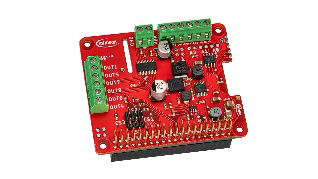


DC Motor Control, Raspberry Pi HAT, enabled for Raspberry Pi
12 half-bridges, 5.5-20V, 3.6A, 5V/2.5A buck converter, SPI interface, internal 3ch PWM generator, protection, diagnosis
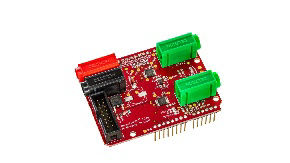


DC Motor Control, Arduino Uno, enabled for Arduino
2 half-bridges, 6-18V, 7A, 2 kHz PWM interface, protection, diagnosis
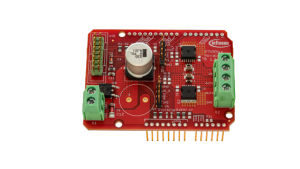


DC Motor Control, Arduino Uno, enabled for Arduino
2 half-bridges, 8-18V, 10A, PWM interface, protection, diagnosis
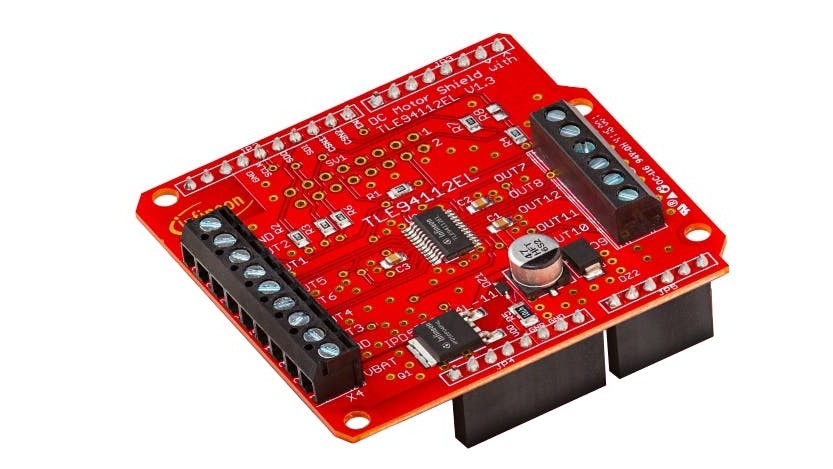


DC Motor Control, Arduino Uno, enabled for Arduino
12 half-bridges, 5.5-18V, 3.6A, SPI interface, internal 3ch PWM generator, protection, diagnosis
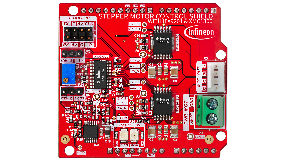


Stepper Motor Control, Arduino Uno, enabled for Arduino
2 H-bridges, 24V, 5A, I2C interface, microstepping, protection, diagnosis
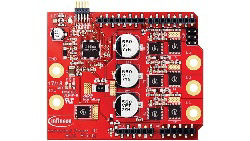


BLDC Motor Control, Arduino Uno, enabled for Arduino
SoC, 6-28V, 10A, 0-25 kHz, SPI interface, FOC, BEMF, Hall
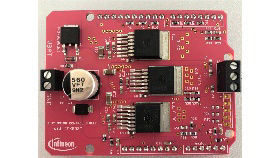


BLDC Motor Control, Arduino Uno, enabled for Arduino
3 half-bridges, 8-40V, PWM interface, protection, diagnosis
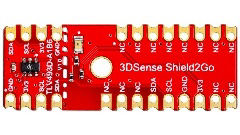


3D Magnetic Sensor, Shield2Go, enabled for Arduino & Raspberry Pi
3 dimensional magnetic sensing, I2C interface, accuracy ±130 mT, 12-bit resolution per axis
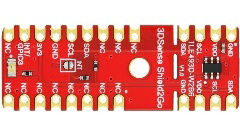


3D Magnetic Sensor, Shield2Go, enabled for Arduino & Raspberry Pi
3 dimensional magnetic sensing, I2C interface, accuracy ±160 mT, 12-bit resolution per axis, 10-bit temperature sensor
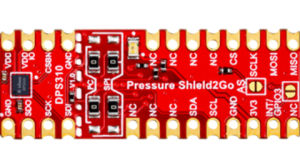


Air Pressure Sensor, Shield2Go, enabled for Arduino, Raspberry Pi & MicroPython
±0.005hPa resolution (equating to ±5cm), 300-1200hPa, I2C and SPI interface
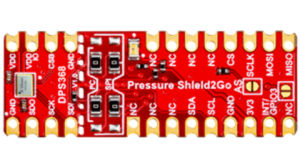


Air Pressure Sensor, Shield2Go, enabled for Arduino, Raspberry Pi & MicroPython
±0.002hPa resolution (equating to ±2cm), 300-1200hPa, I2C and SPI interface, IPx8 certified: temporary immersion of 50m for 1 hour
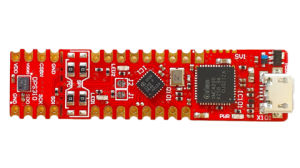


Air Pressure Sensor, Kit 2Go, enabled for Arduino
±0.005hPa resolution (equating to ±5cm), 300-1200hPa, I2C and SPI interface
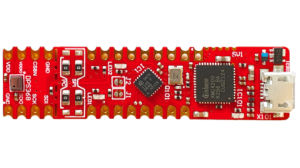


Air Pressure Sensor, Kit 2Go, enabled for Arduino
±0.002hPa resolution (equating to ±2cm), 300-1200hPa, I2C and SPI interface, IPx8 certified: temporary immersion of 50m for 1 hour
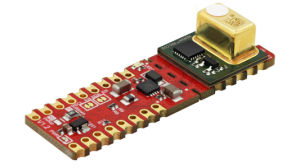


CO2 Sensor, Shield2Go, enabled for Arduino & MicroPython
accuracy ±30 ppm ±3% of reading, I2C, PWM and UART interface, advanced compensation and self-calibration
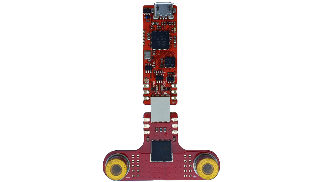


Current Sensor, Kit 2Go, enabled for Arduino
bi-directional AC and DC current measurement, 25A, 0.7µs over current detection, on-board XMC1100 and debugger, analog interface
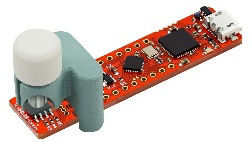


Magnetic Angle Sensor, Kit 2Go, enabled for Arduino
5V input, 3.3V logic level, SSC & IIF interfaces, on-board XMC1100 and debugger
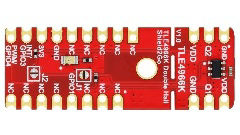


Magnetic Hall Switch, Shield2Go, enabled for Arduino
Double hall-effect switch, direction & speed information, 2.7-24V, stable switching point, GPIO interface
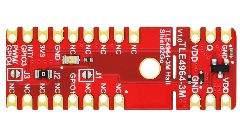


Magnetic Hall Switch, Shield2Go, enabled for Arduino
Unipolar hall-effect switch, position detection, 3.0-32V, stable magnetic threshold, GPIO interface
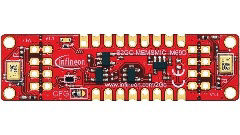


MEMS Microphone, Shield2Go, enabled for Arduino, Raspberry Pi & MicroPython
Stereo configuration, 105dB dynamic range, 69dB(A) SNR, sensitivity and phase matched, PDM & I2S interface
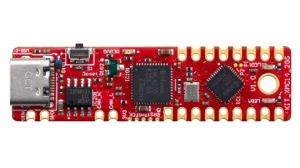


XMC™ Microcontroller, Kit 2Go, enabled for Arduino
Input 5-20V, 3.3V logic level, ARM® Cortex™-M0 core, 48 MHz, 200 KB flash, 16KB RAM, on-board debugger, CAN transceiver, reset button
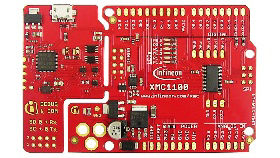


XMC™ Microcontroller, Arduino Uno, enabled for Arduino
Input 5V (USB), 7-12V (DC in), 5V/3.3V switchable logic level, ARM® Cortex™-M0 core, detachable on-board debugger, user LEDs
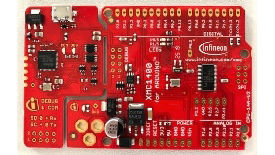


XMC™ Microcontroller, Arduino Uno, enabled for Arduino
Input 5V (USB), 7-12V (DC in), 5V/3.3V switchable logic level, ARM® Cortex™-M0 core, detachable on-board debugger, CAN interface, user LEDs
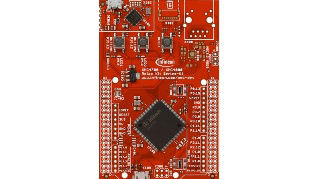


XMC™ Microcontroller, Arduino Uno, enabled for Arduino
Input 5V, 3.3V logic level, ARM® Cortex®-M4 core, 144MHz, 2MB flash, 352KB RAM, on-board debugger, user LEDs, user buttons, reset button
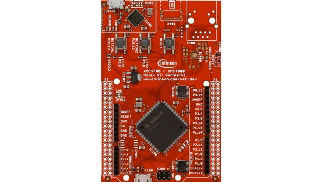


XMC™ Microcontroller, Arduino Uno, enabled for Arduino
Input 5V, 5V logic level, ARM® Cortex®-M4 core, 144MHz, 2MB flash, 352KB RAM, on-board debugger, user LEDs, user buttons, reset button
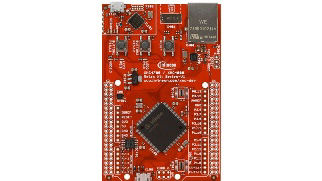


XMC™ Microcontroller, Arduino Uno, enabled for Arduino
Input 5V, 3.3V logic level, ARM® Cortex®-M4 core, 144MHz, 2MB flash, 352KB RAM, on-board debugger, user LEDs, user buttons, reset button, microSD card slot, CAN transceiver, ethernet connector
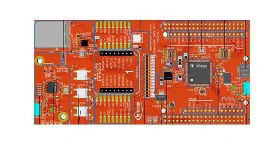


XMC™ Microcontroller, Arduino Uno, Shield2Go, mikroBUS, enabled for Arduino
Input 5V, 3.3V logic level, ARM® Cortex®-M4 core, 120MHz, 512kB flash, 80kB RAM, on-board debugger, CAN transceiver, ethernet connector, user LEDs, user buttons, reset button
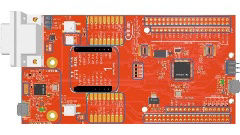


XMC™ Microcontroller, Arduino Uno, Shield2Go, mikroBUS, enabled for Arduino
Input 5V, 3.3V logic level, ARM® Cortex®-M4 core, 120MHz, 512kB flash, 80kB RAM, on-board debugger, CAN transceiver, RS-323 connector, user LEDs, user buttons, reset button
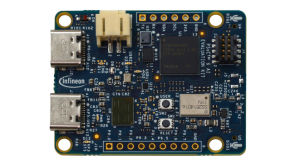


PSOC™ 6 Microcontroller, enabled for Arduino, MicroPython & DEEPCRAFT™ Studio
5V input, 3.3V logic level, battery connector, PSOC62 dual-core (Arm Cortex M4 & M0+), on-board debugger, on-board sensors (60 GHz radar, temperature, air pressure, 2x MEMS microphone, 6-axis IMU, 3-axis magnetometer), QSPI memory, Wi-Fi & Bluetooth connectivity, QWIIC connector, 2 user LEDs, 2 user buttons, reset button
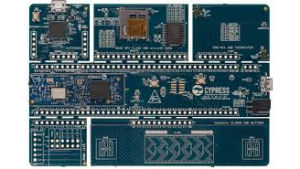


PSOC™ 6 Microcontroller, enabled for MicroPython
5V input, 3.3V/1.8V switchable logic level, PSOC62 dual-core (Arm Cortex M4 & M0+), on-board detachable debugger, on-board sensors (2 PDM microphones, thermistor), QSPI memory, microSD card slot, Wi-Fi & Bluetooth connectivity, user LED, user button, reset button, CAPSENSE buttons & slider
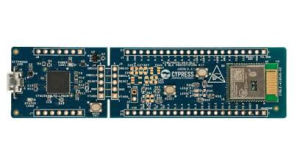


PSOC™ 6 Microcontroller, enabled for MicroPython
5V input, 3.3V logic level, PSOC63 (Arm Cortex M4), on-board detachable debugger, BLE connectivity, 2 user LEDs, user button, reset button
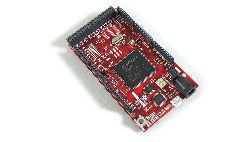


AURIX Microcontroller, Arduino Mega, enabled for Arduino
Input 5V (USB), 9-12V (DC in), 5V/3.3V switchable logic level, TC275 32-bit TriCore processor, 200MHz, 4MB flash, 472kB RAM, USB debugging, reset button, CAN transceiver
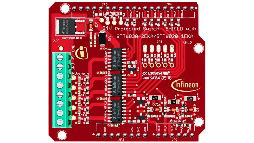


Low-Side-Switch, Arduino Uno, enabled for Arduino
5 protected switch channels, 8-36V, 5A, 400 kHz PWM interface, protection, diagnosis
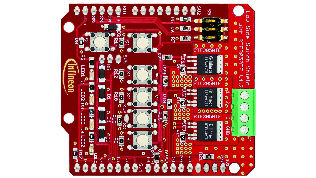


Low-Side-Switch, Arduino Uno, enabled for Arduino
3 protected switches, 8-18V, 3A, 14 kHz PWM interface, protection, diagnosis
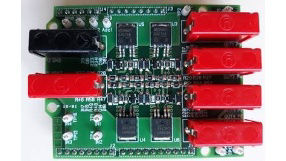


High-Side-Switch, Arduino Uno
4 protected switches, 5.8-18V, 24A, PWM interface, protection, diagnosis
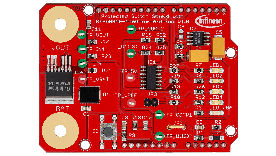


High-Side-Switch, Arduino Uno, enabled for Arduino
8-18V, 40A, PWM interface, protection, diagnosis, push button, status LEDs
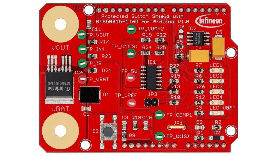


High-Side-Switch, Arduino Uno, enabled for Arduino
8-18V, 33A, PWM interface, protection, diagnosis, push button, status LEDs
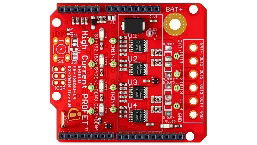


High-Side-Switch, Arduino Uno, enabled for Arduino
4 protected switches, 3.1-28V, 21A, 400Hz PWM interface, protection, diagnosis, status LEDs
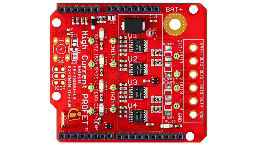


High-Side-Switch, Arduino Uno, enabled for Arduino
4 protected switches, 3.1-28V, 15A, 400Hz PWM interface, protection, diagnosis, status LEDs
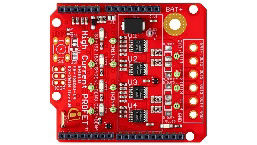


High-Side-Switch, Arduino Uno, enabled for Arduino
4 protected switches, 3.1-28V, 12.5A, 400Hz PWM interface, protection, diagnosis, status LEDs
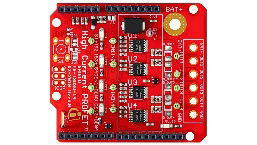


High-Side-Switch, Arduino Uno, enabled for Arduino
4 protected switches, 3.1-28V, 10A, 400Hz PWM interface, protection, diagnosis, status LEDs
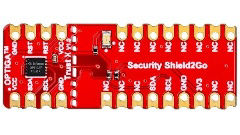


Hardware Security, Shield2Go, enabled for Arduino & Raspberry Pi
Device authentication, PKI networks, I2C interface, ECC256 bit, AES128, SHA-256
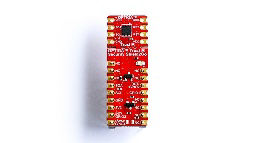


Hardware Security, Shield2Go, enabled for Arduino & Raspberry Pi
CC EAL6+ (high) certified high-end security controller, I2C interface, hibernate mode
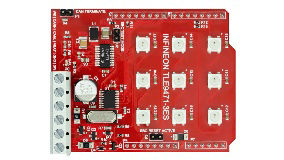


Lite System Basis Chip, Arduino Uno, enabled for Arduino
5V 100mA LDO, 5V 500mA DC/DC, CAN - SPI controller, CAN FD, charge pump, protection, addressable RGB LEDs
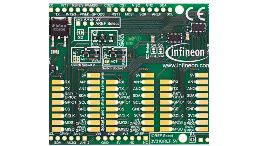


Adapter, Arduino Uno, enabled for Arduino
3 Shield2Go slots for quick prototyping with Arduino Uno and Shield2Go
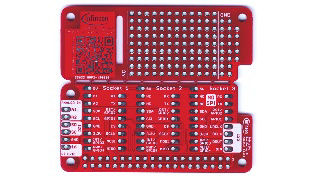


Adapter, Raspberry Pi HAT, enabled for Raspberry Pi
3 Shield2Go slots for quick prototyping with Raspberry Pi and Shield2Go



DC Motor Control, Raspberry Pi HAT, enabled for Raspberry Pi
12 half-bridges, 5.5-20V, 3.6A, 5V/2.5A buck converter, SPI interface, internal 3ch PWM generator, protection, diagnosis



DC Motor Control, Arduino Uno, enabled for Arduino
2 half-bridges, 6-18V, 7A, 2 kHz PWM interface, protection, diagnosis



DC Motor Control, Arduino Uno, enabled for Arduino
2 half-bridges, 8-18V, 10A, PWM interface, protection, diagnosis



DC Motor Control, Arduino Uno, enabled for Arduino
12 half-bridges, 5.5-18V, 3.6A, SPI interface, internal 3ch PWM generator, protection, diagnosis



Stepper Motor Control, Arduino Uno, enabled for Arduino
2 H-bridges, 24V, 5A, I2C interface, microstepping, protection, diagnosis



BLDC Motor Control, Arduino Uno, enabled for Arduino
SoC, 6-28V, 10A, 0-25 kHz, SPI interface, FOC, BEMF, Hall



BLDC Motor Control, Arduino Uno, enabled for Arduino
3 half-bridges, 8-40V, PWM interface, protection, diagnosis



3D Magnetic Sensor, Shield2Go, enabled for Arduino & Raspberry Pi
3 dimensional magnetic sensing, I2C interface, accuracy ±130 mT, 12-bit resolution per axis



3D Magnetic Sensor, Shield2Go, enabled for Arduino & Raspberry Pi
3 dimensional magnetic sensing, I2C interface, accuracy ±160 mT, 12-bit resolution per axis, 10-bit temperature sensor



Air Pressure Sensor, Shield2Go, enabled for Arduino, Raspberry Pi & MicroPython
±0.005hPa resolution (equating to ±5cm), 300-1200hPa, I2C and SPI interface



Air Pressure Sensor, Shield2Go, enabled for Arduino, Raspberry Pi & MicroPython
±0.002hPa resolution (equating to ±2cm), 300-1200hPa, I2C and SPI interface, IPx8 certified: temporary immersion of 50m for 1 hour



Air Pressure Sensor, Kit 2Go, enabled for Arduino
±0.005hPa resolution (equating to ±5cm), 300-1200hPa, I2C and SPI interface



Air Pressure Sensor, Kit 2Go, enabled for Arduino
±0.002hPa resolution (equating to ±2cm), 300-1200hPa, I2C and SPI interface, IPx8 certified: temporary immersion of 50m for 1 hour



CO2 Sensor, Shield2Go, enabled for Arduino & MicroPython
accuracy ±30 ppm ±3% of reading, I2C, PWM and UART interface, advanced compensation and self-calibration



Current Sensor, Kit 2Go, enabled for Arduino
bi-directional AC and DC current measurement, 25A, 0.7µs over current detection, on-board XMC1100 and debugger, analog interface



Magnetic Angle Sensor, Kit 2Go, enabled for Arduino
5V input, 3.3V logic level, SSC & IIF interfaces, on-board XMC1100 and debugger



Magnetic Hall Switch, Shield2Go, enabled for Arduino
Double hall-effect switch, direction & speed information, 2.7-24V, stable switching point, GPIO interface



Magnetic Hall Switch, Shield2Go, enabled for Arduino
Unipolar hall-effect switch, position detection, 3.0-32V, stable magnetic threshold, GPIO interface



MEMS Microphone, Shield2Go, enabled for Arduino, Raspberry Pi & MicroPython
Stereo configuration, 105dB dynamic range, 69dB(A) SNR, sensitivity and phase matched, PDM & I2S interface



XMC™ Microcontroller, Kit 2Go, enabled for Arduino
Input 5-20V, 3.3V logic level, ARM® Cortex™-M0 core, 48 MHz, 200 KB flash, 16KB RAM, on-board debugger, CAN transceiver, reset button



XMC™ Microcontroller, Arduino Uno, enabled for Arduino
Input 5V (USB), 7-12V (DC in), 5V/3.3V switchable logic level, ARM® Cortex™-M0 core, detachable on-board debugger, user LEDs



XMC™ Microcontroller, Arduino Uno, enabled for Arduino
Input 5V (USB), 7-12V (DC in), 5V/3.3V switchable logic level, ARM® Cortex™-M0 core, detachable on-board debugger, CAN interface, user LEDs



XMC™ Microcontroller, Arduino Uno, enabled for Arduino
Input 5V, 3.3V logic level, ARM® Cortex®-M4 core, 144MHz, 2MB flash, 352KB RAM, on-board debugger, user LEDs, user buttons, reset button



XMC™ Microcontroller, Arduino Uno, enabled for Arduino
Input 5V, 5V logic level, ARM® Cortex®-M4 core, 144MHz, 2MB flash, 352KB RAM, on-board debugger, user LEDs, user buttons, reset button



XMC™ Microcontroller, Arduino Uno, enabled for Arduino
Input 5V, 3.3V logic level, ARM® Cortex®-M4 core, 144MHz, 2MB flash, 352KB RAM, on-board debugger, user LEDs, user buttons, reset button, microSD card slot, CAN transceiver, ethernet connector



XMC™ Microcontroller, Arduino Uno, Shield2Go, mikroBUS, enabled for Arduino
Input 5V, 3.3V logic level, ARM® Cortex®-M4 core, 120MHz, 512kB flash, 80kB RAM, on-board debugger, CAN transceiver, ethernet connector, user LEDs, user buttons, reset button



XMC™ Microcontroller, Arduino Uno, Shield2Go, mikroBUS, enabled for Arduino
Input 5V, 3.3V logic level, ARM® Cortex®-M4 core, 120MHz, 512kB flash, 80kB RAM, on-board debugger, CAN transceiver, RS-323 connector, user LEDs, user buttons, reset button



PSOC™ 6 Microcontroller, enabled for Arduino, MicroPython & DEEPCRAFT™ Studio
5V input, 3.3V logic level, battery connector, PSOC62 dual-core (Arm Cortex M4 & M0+), on-board debugger, on-board sensors (60 GHz radar, temperature, air pressure, 2x MEMS microphone, 6-axis IMU, 3-axis magnetometer), QSPI memory, Wi-Fi & Bluetooth connectivity, QWIIC connector, 2 user LEDs, 2 user buttons, reset button



PSOC™ 6 Microcontroller, enabled for MicroPython
5V input, 3.3V/1.8V switchable logic level, PSOC62 dual-core (Arm Cortex M4 & M0+), on-board detachable debugger, on-board sensors (2 PDM microphones, thermistor), QSPI memory, microSD card slot, Wi-Fi & Bluetooth connectivity, user LED, user button, reset button, CAPSENSE buttons & slider



PSOC™ 6 Microcontroller, enabled for MicroPython
5V input, 3.3V logic level, PSOC63 (Arm Cortex M4), on-board detachable debugger, BLE connectivity, 2 user LEDs, user button, reset button



AURIX Microcontroller, Arduino Mega, enabled for Arduino
Input 5V (USB), 9-12V (DC in), 5V/3.3V switchable logic level, TC275 32-bit TriCore processor, 200MHz, 4MB flash, 472kB RAM, USB debugging, reset button, CAN transceiver



Low-Side-Switch, Arduino Uno, enabled for Arduino
5 protected switch channels, 8-36V, 5A, 400 kHz PWM interface, protection, diagnosis



Low-Side-Switch, Arduino Uno, enabled for Arduino
3 protected switches, 8-18V, 3A, 14 kHz PWM interface, protection, diagnosis



High-Side-Switch, Arduino Uno
4 protected switches, 5.8-18V, 24A, PWM interface, protection, diagnosis



High-Side-Switch, Arduino Uno, enabled for Arduino
8-18V, 40A, PWM interface, protection, diagnosis, push button, status LEDs



High-Side-Switch, Arduino Uno, enabled for Arduino
8-18V, 33A, PWM interface, protection, diagnosis, push button, status LEDs



High-Side-Switch, Arduino Uno, enabled for Arduino
4 protected switches, 3.1-28V, 21A, 400Hz PWM interface, protection, diagnosis, status LEDs



High-Side-Switch, Arduino Uno, enabled for Arduino
4 protected switches, 3.1-28V, 15A, 400Hz PWM interface, protection, diagnosis, status LEDs



High-Side-Switch, Arduino Uno, enabled for Arduino
4 protected switches, 3.1-28V, 12.5A, 400Hz PWM interface, protection, diagnosis, status LEDs



High-Side-Switch, Arduino Uno, enabled for Arduino
4 protected switches, 3.1-28V, 10A, 400Hz PWM interface, protection, diagnosis, status LEDs



Hardware Security, Shield2Go, enabled for Arduino & Raspberry Pi
Device authentication, PKI networks, I2C interface, ECC256 bit, AES128, SHA-256



Hardware Security, Shield2Go, enabled for Arduino & Raspberry Pi
CC EAL6+ (high) certified high-end security controller, I2C interface, hibernate mode



Lite System Basis Chip, Arduino Uno, enabled for Arduino
5V 100mA LDO, 5V 500mA DC/DC, CAN - SPI controller, CAN FD, charge pump, protection, addressable RGB LEDs



Adapter, Arduino Uno, enabled for Arduino
3 Shield2Go slots for quick prototyping with Arduino Uno and Shield2Go



Adapter, Raspberry Pi HAT, enabled for Raspberry Pi
3 Shield2Go slots for quick prototyping with Raspberry Pi and Shield2Go
Infineon concentrates on building a strong relationship with its communities and shares dedicated expertise within the hardware & software developer network by leveraging the power of community platforms. Our target is to build a strong relationship with all developers by establishing road-tests, design challenges and sharing outstanding stories of our makers. Follow us in our communities and learn about Infineon’s product portfolio, project showcases, great ideas and latest technologies.



